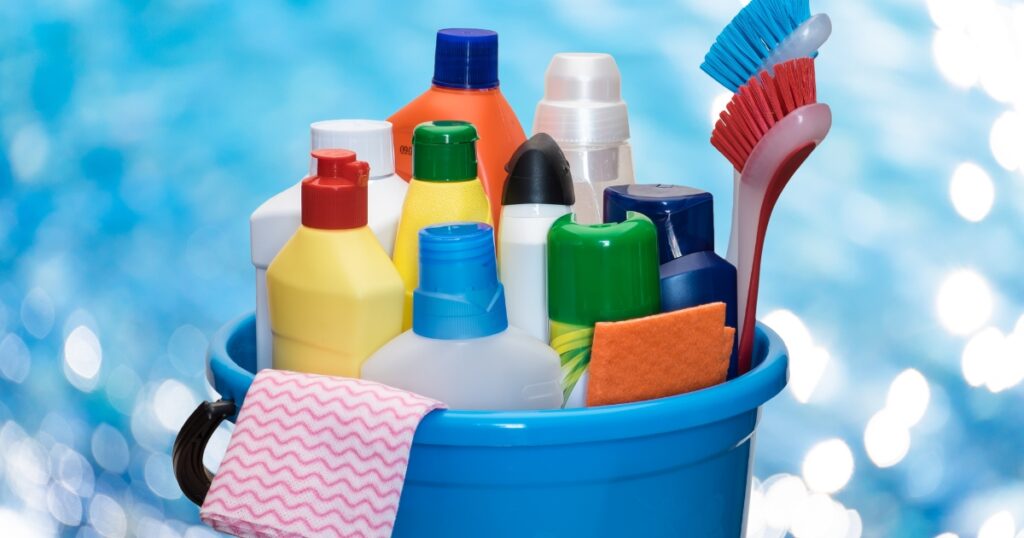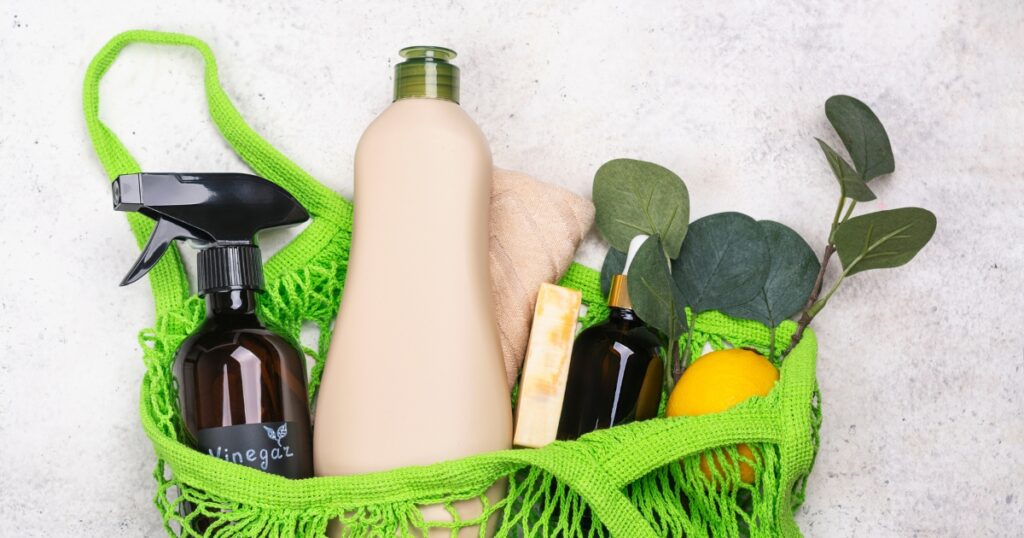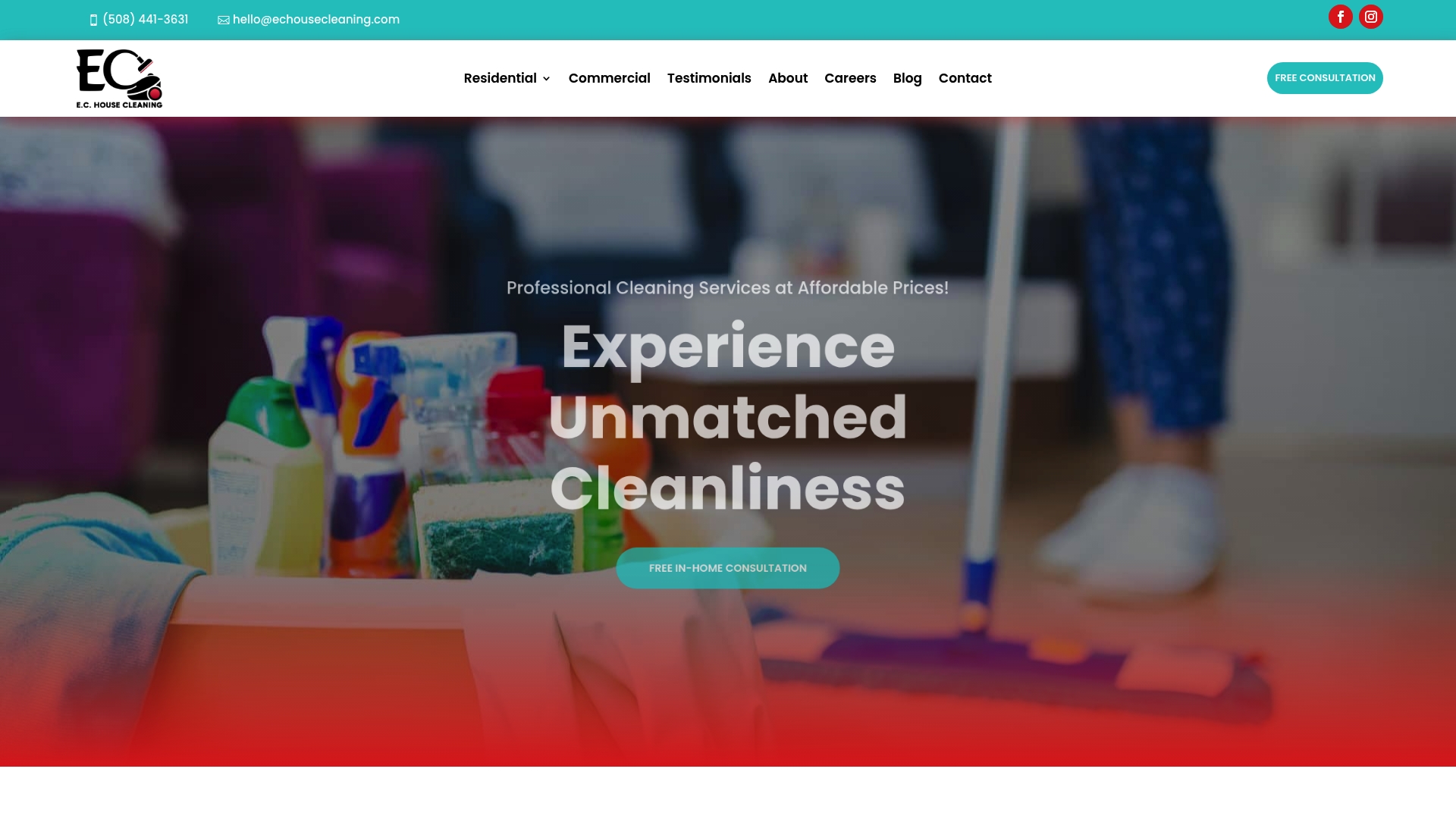Green cleaning is changing the way people care for their homes in Massachusetts. Most folks still reach for traditional cleaners packed with chemicals, thinking that’s the only way to really get things clean. Here is what might surprise you. Many conventional cleaning products release volatile organic compounds (VOCs) into the air, contributing to indoor pollution and health risks, according to Harvard research. Green cleaning offers a safer method that protects your health, the environment, and even your wallet all at once.
Table of Contents: What is Green Cleaning?
Quick Summary
| Takeaway | Explanation |
|---|---|
| Adopt eco-friendly cleaning products | Use certified green cleaning solutions to minimize harmful chemical exposure. |
| Implement practical green cleaning techniques | Simple methods like using microfiber cloths reduce pollution and improve air quality. |
| Consider the environmental impact of cleaning | Protect local ecosystems in Massachusetts by avoiding traditional harmful cleaning chemicals. |
| Create your own cleaning solutions | Use household ingredients like vinegar and baking soda for affordable, non-toxic cleaning options. |
| Stay informed on green cleaning practices | Continuously learn about new eco-friendly technologies to enhance your cleaning strategies. |
Understanding What Is Green Cleaning
Green cleaning represents a comprehensive approach to maintaining cleanliness that prioritizes environmental health and human safety. Unlike traditional cleaning methods that rely on harsh chemicals, green cleaning focuses on using environmentally responsible products and practices that minimize negative impacts on both human health and ecological systems.
The Core Principles of Green Cleaning
At its fundamental level, green cleaning goes beyond simply selecting eco-friendly products. Green cleaning encompasses a holistic strategy that considers the entire cleaning process, from product selection to waste management. Learn more about eco-friendly cleaning practices.
The core principles of green cleaning include:
- Reducing Chemical Exposure: Selecting cleaning solutions with minimal toxic ingredients that do not release harmful volatile organic compounds (VOCs)
- Minimizing Environmental Impact: Using biodegradable products that do not contribute to water or air pollution
- Protecting Human Health: Choosing cleaning methods that do not introduce respiratory irritants or potential carcinogens
According to Environmental Protection Agency (EPA) guidelines, green cleaning involves selecting products with reduced environmental and health risks throughout their entire lifecycle. This means considering not just the immediate cleaning performance, but also the production, packaging, distribution, use, and disposal of cleaning products.

Why Green Cleaning Matters
Traditional cleaning products often contain chemicals that can cause significant environmental and health concerns. Many conventional cleaning solutions include ingredients linked to respiratory issues, skin irritations, and potential long-term health risks. By contrast, green cleaning provides a safer alternative that protects both human health and ecological systems.
Research from Harvard T.H. Chan School of Public Health indicates that some traditional cleaning products can contribute to indoor air pollution and potential health risks. Green cleaning methods offer a proactive approach to maintaining clean spaces while simultaneously reducing potential harmful exposures.
Implementing green cleaning practices is not just an environmental choice but a comprehensive strategy for creating healthier living and working environments. Whether in homes, offices, or commercial spaces, green cleaning represents a responsible approach to maintenance that considers the broader implications of our cleaning choices.
By understanding and adopting green cleaning principles, individuals and organizations can contribute to a more sustainable and health-conscious approach to maintaining clean spaces. The shift towards green cleaning is more than a trend—it is a meaningful commitment to environmental stewardship and human well-being.
Why Green Cleaning Matters in Massachusetts
Massachusetts has emerged as a leader in environmental sustainability and health-conscious practices, making green cleaning particularly relevant for residents and businesses across the state. The unique environmental landscape and progressive environmental regulations in Massachusetts create a compelling context for adopting eco-friendly cleaning approaches.
Environmental Impact in a Sensitive Ecosystem
Massachusetts features diverse ecosystems, from coastal regions to inland forests, which are especially vulnerable to environmental contamination. Water quality and ecosystem preservation are critical concerns for the state. Learn more about sustainable cleaning practices that protect local environments.
According to the Massachusetts Department of Environmental Protection, traditional cleaning chemicals can significantly impact water systems and marine life. Green cleaning becomes crucial in preventing harmful chemical runoff that could damage sensitive coastal and freshwater ecosystems unique to Massachusetts.

The state’s commitment to environmental protection is evident in its robust regulatory framework. Green cleaning aligns perfectly with Massachusetts’ progressive environmental standards, which emphasize reducing chemical pollution and promoting sustainable practices across residential and commercial sectors.
Health Considerations for Massachusetts Residents
Research from Harvard University’s School of Public Health highlights significant health risks associated with traditional cleaning products, which are particularly relevant in dense urban and suburban environments like those found throughout Massachusetts.
Massachusetts residents face unique health challenges related to indoor air quality, especially in older homes and buildings common in cities like Boston, Cambridge, and Worcester. Green cleaning offers a critical strategy for mitigating potential respiratory issues and chemical sensitivities prevalent in tightly constructed living spaces.
Urban areas in Massachusetts often have high population densities, making the collective impact of cleaning practices even more significant. By adopting green cleaning methods, residents can contribute to broader community health and environmental sustainability efforts.
Economic and Regulatory Advantages
Massachusetts businesses and homeowners can benefit economically from green cleaning practices. Many local municipalities offer incentives for environmentally responsible practices, and green cleaning can lead to long-term cost savings through reduced chemical usage and improved health outcomes.
The state’s progressive environmental policies increasingly favor businesses and residential properties that demonstrate commitment to sustainable practices. Green cleaning is not just an environmental choice but a strategic approach that aligns with Massachusetts’ forward-thinking environmental and health standards.
By embracing green cleaning, Massachusetts residents and businesses can play a crucial role in protecting local ecosystems, improving public health, and supporting the state’s broader environmental sustainability goals. The choice to go green is more than a personal preference—it’s a collective responsibility to preserve the unique environmental heritage of Massachusetts.
Choosing Green Cleaning Solutions for Every Need
Selecting the right green cleaning solutions requires a strategic approach that balances effectiveness, environmental responsibility, and specific cleaning needs. Massachusetts residents and businesses have multiple options for implementing eco-friendly cleaning practices across various environments and scenarios.
Residential Green Cleaning Strategies
Home cleaning demands careful product selection to ensure both safety and performance. Learn more about eco-friendly home cleaning techniques that protect both your living space and the environment.
According to the Massachusetts Environmentally Preferable Products (EPP) Program, consumers should look for third-party certified green cleaning products that meet rigorous environmental and performance standards. These certifications ensure that products minimize harmful chemical exposure while maintaining effective cleaning capabilities.
Key considerations for residential green cleaning include:
- Selecting plant-based, biodegradable cleaning solutions
- Choosing products with minimal packaging
- Prioritizing concentrated formulas to reduce plastic waste
- Avoiding products with harsh chemical fragrances
Professional and Commercial Green Cleaning Solutions
Businesses and commercial spaces require robust cleaning solutions that maintain high standards of cleanliness while minimizing environmental impact. The U.S. Environmental Protection Agency’s Safer Choice program provides comprehensive guidance for selecting appropriate green cleaning products for various commercial environments.
Professional green cleaning solutions should address specific needs across different settings:
- Office spaces requiring daily sanitization
- Healthcare facilities with stringent hygiene requirements
- Educational institutions prioritizing student and staff health
- Hospitality environments maintaining high cleanliness standards
Specialized Green Cleaning Approaches
Different environments demand tailored green cleaning strategies. For instance, kitchen surfaces require different approaches compared to bathroom cleaning or delicate material maintenance. Specialized green cleaning solutions now exist for virtually every cleaning scenario, from wood and stone surfaces to electronic equipment and sensitive fabrics.
Massachusetts residents can access a wide range of eco-friendly cleaning options that cater to specific needs. Whether dealing with tough stains, maintaining delicate surfaces, or addressing unique cleaning challenges, green cleaning technologies continue to evolve and improve.
Consumers and businesses should prioritize products that:
- Carry legitimate third-party environmental certifications
- Provide transparent ingredient lists
- Demonstrate proven cleaning effectiveness
- Minimize environmental and health risks
The journey to comprehensive green cleaning involves continuous learning and adaptation. By staying informed about the latest eco-friendly cleaning technologies and techniques, Massachusetts residents can make responsible choices that protect both their immediate environment and the broader ecosystem.
Choosing green cleaning solutions is more than a trend—it’s a commitment to sustainable living, health protection, and environmental stewardship. Each carefully selected product represents a small but significant step towards creating cleaner, safer, and more responsible living and working spaces.
Simple Steps to Start Green Cleaning Today
Transitioning to green cleaning does not require an overwhelming overhaul of your current practices. With strategic, incremental changes, Massachusetts residents can quickly adopt environmentally responsible cleaning methods that protect both personal health and local ecosystems.
Creating a Green Cleaning Toolkit
Building an eco-friendly cleaning arsenal begins with understanding simple, effective alternatives to traditional chemical-based products. Discover practical home cleaning techniques that prioritize sustainability and effectiveness.
According to NPR’s Life Kit, creating homemade cleaning solutions can be remarkably simple. Basic ingredients like white vinegar, baking soda, and hydrogen peroxide can replace numerous commercial cleaning products. A fundamental all-purpose cleaner can be crafted by mixing 1/4 cup of vinegar with 3/4 cup of water, providing an affordable and non-toxic alternative to store-bought solutions.
Here’s a summary of key components and their uses for your green cleaning toolkit:
| Toolkit Component | Use or Benefit |
|---|---|
| Reusable microfiber cloths | Capture dust, reduce need for paper towels |
| White vinegar | All-purpose cleaning, remove odors, disinfect |
| Baking soda | Scrubbing agent, deodorizer |
| Hydrogen peroxide | Disinfect surfaces, whiten, remove stains |
| Castile soap | Gentle, biodegradable cleaner for various surfaces |
| Essential oils | Add natural fragrance and mild antimicrobial properties |
Implementing Sustainable Cleaning Practices
The University of Georgia Extension recommends five fundamental steps to maintain a clean home while minimizing environmental impact:
- Install doormats at all exterior entries to reduce dirt tracking
- Establish a shoe-free indoor policy
- Use damp mopping techniques instead of dry sweeping
- Clean with microfiber cloths to capture dust effectively
- Vacuum regularly using a HEPA filter vacuum cleaner
These practices not only reduce chemical usage but also significantly decrease the amount of dirt and pollutants entering your living space. By implementing simple preventative measures, you can minimize the need for harsh cleaning chemicals.
To help visualize these practical steps, here’s a table summarizing the recommended sustainable cleaning practices:
| Sustainable Practice | Purpose/Benefit |
|---|---|
| Install doormats at entries | Reduce dirt and pollutants brought indoors |
| Shoe-free indoor policy | Minimize contaminants inside living spaces |
| Use damp mopping instead of dry sweep | Prevent dust from becoming airborne |
| Clean with microfiber cloths | Capture and hold dust more effectively |
| Vacuum regularly with HEPA filter | Remove fine particulates, improve air quality |
Choosing and Using Green Cleaning Products
When selecting commercial green cleaning products, careful label reading is crucial. The University of Minnesota’s Office of Sustainability advises looking for Green Seal certified products, which guarantee non-toxic, biodegradable formulations safe for sensitive skin and environments.
Consumers should be cautious of vague marketing terms like ‘eco-friendly’ or ‘natural’ and instead focus on:
- Transparent ingredient lists
- Third-party environmental certifications
- Biodegradable formulations
- Minimal packaging
- Concentrated solutions to reduce plastic waste
Starting your green cleaning journey does not require perfection. Small, consistent changes can create significant positive impacts. By gradually replacing conventional cleaning products with environmentally responsible alternatives, Massachusetts residents can contribute to broader sustainability efforts while maintaining clean, healthy living spaces.
Remember that green cleaning is a continuous learning process. Stay informed about new technologies, share knowledge with your community, and approach this transition with curiosity and commitment. Each mindful cleaning choice represents a step towards a healthier home and a more sustainable future.

Frequently Asked Questions
What is green cleaning?
Green cleaning refers to the use of eco-friendly products and practices that prioritize environmental safety and human health when cleaning. This approach reduces exposure to harmful chemicals and minimizes the environmental impact of cleaning activities.
Why is green cleaning important in Massachusetts?
Green cleaning is essential in Massachusetts due to the state’s diverse ecosystems and the need to protect water quality and public health. It aligns with Massachusetts’ commitment to environmental sustainability and can help mitigate health risks associated with indoor air pollution.
What are effective green cleaning products I can use at home?
Effective green cleaning products include plant-based, biodegradable solutions, vinegar, baking soda, and hydrogen peroxide. These ingredients can be used for various cleaning tasks, offering a safe and non-toxic alternative to traditional cleaners.
How can I create my own green cleaning supplies?
You can create your own green cleaning supplies using simple household ingredients. For example, a basic all-purpose cleaner can be made by mixing 1/4 cup of vinegar with 3/4 cup of water. Other effective ingredients include baking soda for scrubbing and essential oils for added fragrance and antimicrobial properties.
Make Green Cleaning Easy and Safe for Your Massachusetts Home
Are you worried about the hidden dangers of traditional cleaning products and the impact they may have on your family’s health and the Massachusetts environment? This guide uncovered how green cleaning can reduce harmful chemical exposure and create a healthier, safer home. But putting these eco-friendly strategies into action can be challenging for busy homeowners and property managers who want real results without hassle. That is where our expertise comes in. Explore our Eco Friendly House Cleaning in Spencer, Massachusetts services to see how we use certified green products and methods that match the principles in this article.

Now is the perfect time to let professionals handle the work while you enjoy lasting peace of mind. Our team at E.C. House Cleaning delivers personalized solutions for every need, from deep cleaning and regular upkeep to move-in or post-construction services. Discover how easy green cleaning can be—book a free consultation or request your custom quote today. Your safe, spotless, eco-friendly home is only a click away.
